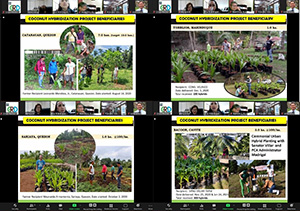 A coconut hybridization project continues to improve coconut production in CALABARZON.
A coconut hybridization project continues to improve coconut production in CALABARZON.
Titled, “Performance Evaluation of the 2-pronged Coconut Hybridization Scheme in CALABARZON,” the project ensures availability of coconut hybrids for the Philippine Coconut Authority’s (PCA) massive coconut planting and replanting program in CALABARZON. Likewise, it capacitates extension workers and farmers with the assisted and directed natural hybridization technology.
The Philippine Council for Agriculture, Aquatic and Natural Resources Research and Development of the Department of Science and Technology (DOST-PCAARRD) is providing funds to this project that is being implemented by PCA-Region IV under the supervision of PCA Deputy Administrator for Research and Development Erlene C. Manohar.
Accomplishments of the project were recently reviewed in a virtual meeting organized by DOST-PCAARRD.
About 8,197 planting materials of PCA 15-10 (Tacunan Dwarf x Laguna Tall) hybrid, the variety best suited for sap production, have been harvested from project sites in Quezon. Almost 40% of these were already distributed to 15 farmers and field-planted in 25.5 hectares in Quezon, Cavite, and Laguna. Likewise, planting materials were given to an interested farmer in Torrijos, Marinduque. It was observed that the produced hybrid nuts are significantly robust, have thicker girth, and good vegetative growth.
 According to the project’s S&T Consultant, Dr. Violeta N. Villegas, the replanting of the old and senile palms will improve the country’s coconut production and consequently improve farm income and the lives of coconut farmers.
According to the project’s S&T Consultant, Dr. Violeta N. Villegas, the replanting of the old and senile palms will improve the country’s coconut production and consequently improve farm income and the lives of coconut farmers.
With increasing demand for emerging high-value products in the global and domestic markets, Ms. Manohar said that the planting of hybrids is seen as the answer to the industry’s pursuit towards global competitiveness.
Project team members from PCA-Region IV and PCA-Zamboanga Research Center, as well as the Crops Research Division representatives led by its Director, Dr. Edna A. Anit participated in the review.
